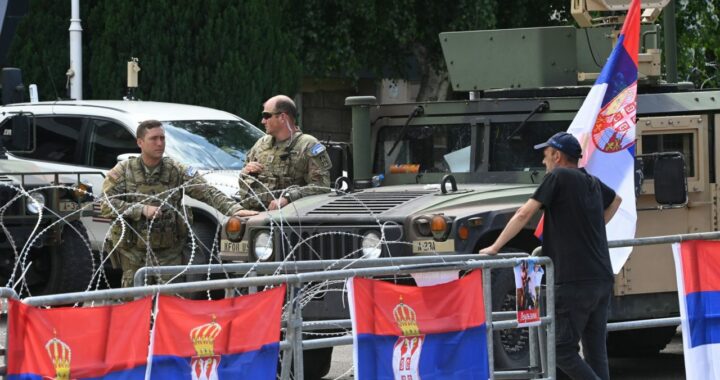

 A man leans on a barrier decorated in Serbian flags while US soldiers of the NATO-led international peacekeeping Kosovo Force (KFOR) stand guard in Leposavic, Kosovo, June 2, 2023. Photo: EPA-EFE/GEORGI LICOVSKI
A man leans on a barrier decorated in Serbian flags while US soldiers of the NATO-led international peacekeeping Kosovo Force (KFOR) stand guard in Leposavic, Kosovo, June 2, 2023. Photo: EPA-EFE/GEORGI LICOVSKI
Upping the pressure on Albin Kurti's embattled government, the EU has announced a package of 'reversible' measures against Kosovo, citing its failure to restore calm in the Serb-majority north.
EU spokesman Peter Stano on Wednesday said the 27 EU member states had “unanimously” agreed to take “reversible and temporary measures” against Kosovo, “depending on the development on the ground and credible decisive steps by (Kosovo) Prime Minister (Albin) Kurti”.
According to Stano, “the EU has prepared proposals with measures with immediate effect”.
Some of the measures he mentioned include “suspension of high-level visits, contacts and events as well as our financial cooperation with Kosovo”.
Stressing that “there are no sanctions”, Stano added that, “despite our repeated calls, Prime Minister Kurti has so far failed to take decisive steps and actions to de-escalate” the tense situation in the Serb-majority north, where protests have continued since May 26.
Referring to the five-steps proposal for de-escalation that Kurti announced on Tuesday, Stano said that this proposal “fails to adequately address some key elements which triggered, are the route cause of the latest crisis, and which we expect him to address urgently with decisive measures”.
Kurti told media on Tuesday that he had proposed a five-step solution to the EU foreign policy chief Josep Borrell.
These comprise: “The rule of law in the northern municipalities, to ensure it is created immediately by identifying the members who have contributed (in the violent protests of May 29, 2023); violent groups to be withdrawn from the territory of Kosovo; Kosovo police and (NATO peacekeeping mission in Kosovo) KFOR will conduct joint security assessments every 15 days; the government will coordinate with all the actors to hold extraordinary elections; and Kosovo and Serbia to return to the Brussels mediated dialogue”.
Stano, however said on Wednesday that this was not enough.
“We have to move from crisis management to sustainable process and calm needs to be restored in the north of Kosovo,” he said, adding: “We expect Prime Minister Kurti to implement steps to de-escalate the situation.”
He also said the EU is “ready to take measures if we find Serbia is not complying,” but noted that, for the moment, “Serbia [has] started withdrawing parts of its forces from the border” with Kosovo.
On June 3, Borrell called for Kosovo and Serbia to take actions to de-escalate the situation, warning to “implement resolute measures”.
The EU asked Kosovo to “suspend police operations in the vicinity of the municipal buildings in the north of Kosovo and” hold new elections in North Mitrovica, Leposavic, Zvecan and Zubin Potok, saying that “we expect Kosovo Serbs to take part in these elections”.
Protests in Zvecan, Leposavic and Zubin Potok started one day after the newly elected mayors of these Serb-majority municipalities took their oaths of office following elections that Serbs boycotted en masse.
The protesters urged the three new ethnic Albanian mayors not to work from municipality facilities and for Kosovo police to be withdrawn.
On May 29, 30 NATO troops from the KFOR peacekeeping mission were injured in violent clashes with protesting Serbs. Around 50 protesters also received medical attention.
Since the start of the protests on May 26, Kosovo’s Association of Journalists has registered over 20 attacks against media crews.
The US was the first to take measures against Kosovo in late May by canceling Kosovo’s participation in the US-led Defender Europe 2023 military exercise.
14 June 2023 - 15:28

A claim that Kosovo Police assaulted a young man at a checkpoint in No...

More than two years since the deal was made, EU Special Representative...

The high-level dialogue between Kosovo and Serbia has been low on the ...

Slavko Simic of the Belgrade-backed Srpska Lista party pleaded not gui...